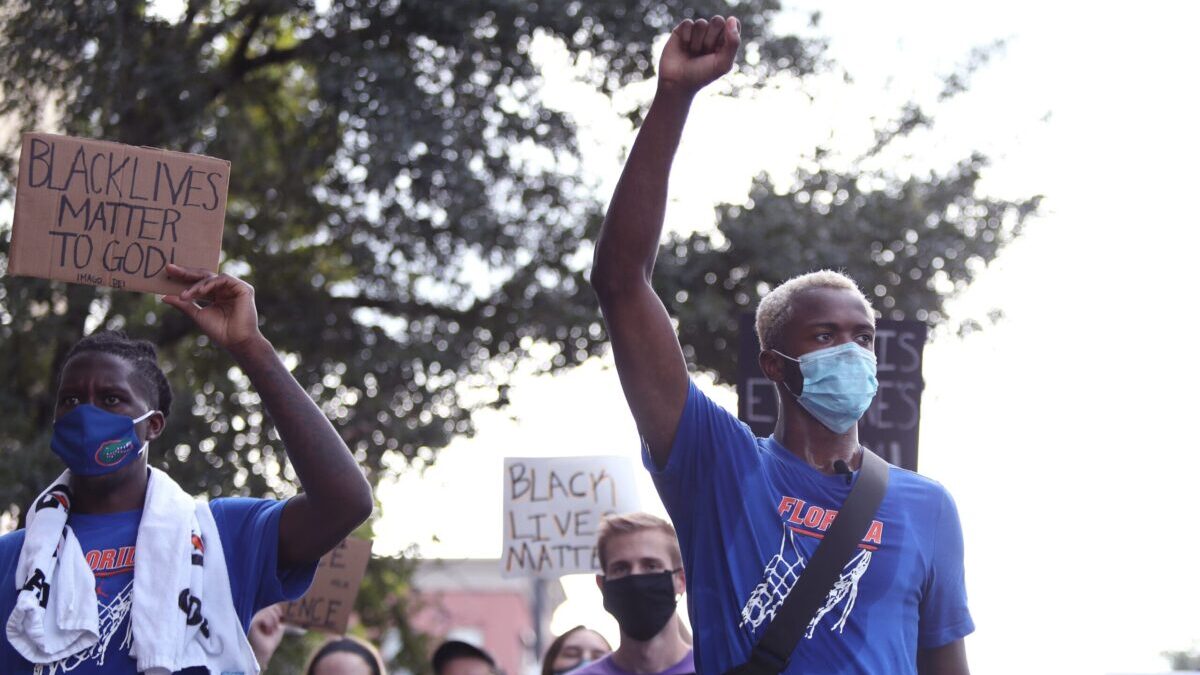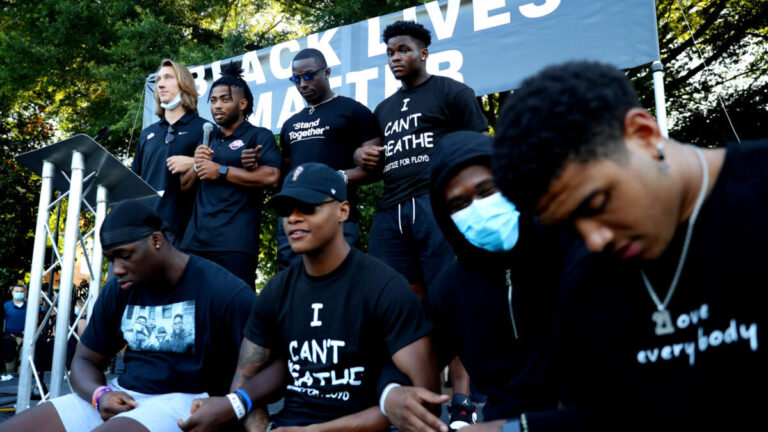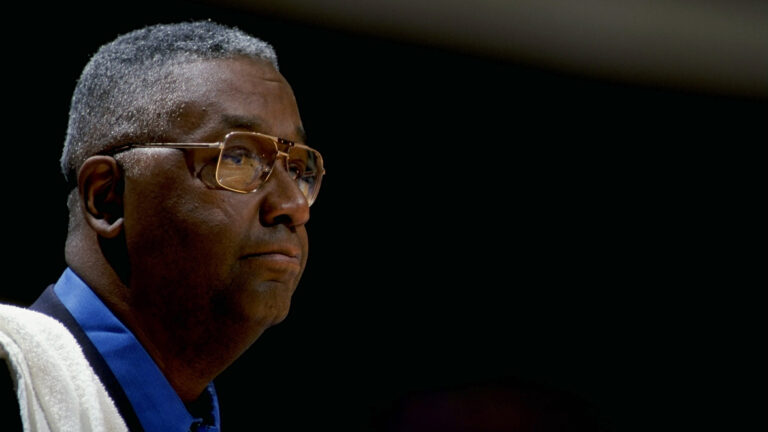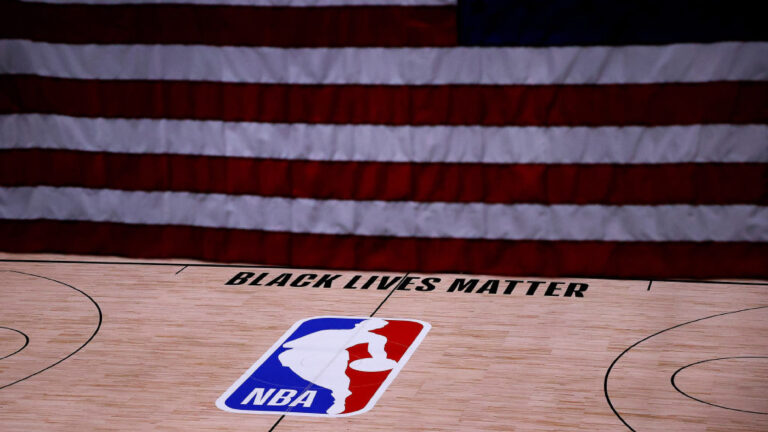College Athletes Unite Around #BlackLivesMatter
Why this matters
As the Black Lives Matter movement has grown in recent years, many pro athletes have been using their platform to support it, but college athletes have been less visible. Now, they are speaking out and refusing to “shut up and dribble”— ushering in a new era of college-athlete activists.
The summer of 2020 may have been a turning point for college athletes’ advocacy. Because COVID-19 put most athletic activity on hold, student-athletes who normally spent the summer focused on gearing up for the fall had more time on their hands—at the same time the U.S. reeled from the effects of Ahmaud Arbery and Breonna Taylor being killed. And then George Floyd. And then Jacob Blake.
Pro athletes have been vocal about these issues in recent history—from the first time Colin Kaepernick took a knee on the field to the Milwaukee Bucks shutting down their playoff game on August 26. But around the country this summer, as the Black Lives Matter movement has come to the forefront, college athletes have spoken out about police brutality and racial injustices. Now, they may have opened the door wider for other student-athletes to step in as advocates.
“College athletes really have a platform that they can use,” said University of Michigan football player Hunter Reynolds. After George Floyd’s death, Reynolds and some of his current and former teammates wanted to do something to move beyond talk about racial injustice, so they founded College Athlete Unity. In August, Reynolds and another member of the group, Eastern Michigan University football player Tariq Speights, led a march in Ann Arbor.
Student-athletes know that people are watching what they do. Reynolds pointed out that, although Big 10 football was postponed, the University of Michigan has 110,000 people at each game in a normal year, plus the millions watching it on TV, “so anything that’s done or said at one of those games is reaching millions of people.”
This summer’s COVID shutdowns left college athletes in a position to step up, Reynolds said. “It’s not like the police killing unarmed Black people is something specifically 2020. It’s been happening for as long as I can remember, unfortunately. But there’s never been a pandemic in my lifetime that’s taken as much of a toll on everything as COVID has.”
Reynolds said, “I think we've seen a good number of athletes either organizing events or speaking out about different injustices that they see, just even this summer.” He added, “I think you'll continue to see more and more of that.”
University of Florida basketball player Scottie Lewis led a protest in Asbury Park, N.J., in June and another one in late August in Gainesville. Along with his teammates, the protest included Florida volleyball, soccer, football, and baseball players, as well as members of the local community. “I put myself in the shoes of all the people that have passed . . . the fact that it could have been me, and I could be in a different situation if I wasn’t dribbling the basketball,” Lewis said in a call with the media. “I just know when something needs to be said, you say it.”
Through these protests, college athletes are “making people understand that we're people before players,” Lewis explained. “Regardless of how high I can jump or how fast I can run, or the height I can catch a basketball or a football, if I get pulled over by the cops, they’re not going to care that much. They’re going to treat me the same way they would treat anyone else that looks like me.”
In June, shortly after George Floyd’s death, University of California at Santa Barbara soccer players Lauren Moss and Hannah Wendelken came up with the idea to organize a run to raise money for Black Lives Matter. They brought in teammate Evann Smith, who had been feeling frustrated that she couldn’t attend the protests in person. Organizing a run allowed her a positive outlet, she said. “We planned it the next day and set up the GoFundMe, and our initial goal was $1,000”—which they didn’t expect to reach. The idea morphed into the organization Athletes4CHNGES, founded by Smith, Wendelken, and San Jose State athletes Natasha Harris, Darrian Reed, and Caleb Simmons.
They invited student-athletes around the country to run, walk, bike, or swim 8.46 miles—to acknowledge the 8 minutes and 46 seconds Floyd had an officer’s knee on his neck—and share their miles on social media. They hit $1,000 in the first three hours and ended up raising nearly $80,000, which they donated to the organization Black Lives Matter.
This athletic event resonated with athletes because “they could use their athleticism to make a difference,” Smith said. “This event made me realize activism isn’t just through protest. You can make change through different avenues.”
Now, Athletes4CHNGES works to “create a platform to educate and empower others to speak out and fight against social inequalities and injustices in our communities,” according to the group’s mission statement. “Together, we connect and inspire athletes to implement real change.”
Smith said many other college athletes she’s talked with are passionate about Black Lives Matter and other causes. “They’re feeling their power and seeing that they can make a tangible impact,” she said.
Former Missouri State University President Michael Nietzel agreed. He recently compared today’s student-athlete activists to those who protested the Vietnam War in the 1960s and ‘70s. “There is a snowballing effect as a new generation of athletes discover they’ve got quite a bit of power,” he said. “You saw that most recently with the NBA shutting down games during the playoff. There is no NBA without the players, and they know that. And I think you’re seeing that now with college athletes as well.”
Athletes at large sports schools are “the most often in the public eye of any students on campus. Whether you like that or not from a set of academic values, that is the reality,” Nietzel said. “The public doesn’t know who the best trumpet player is at the University of Michigan, but it knows who the starting linebackers are.”
Student-athletes have been speaking out about both external injustices and internal ones, including racist incidents they’ve experienced or witnessed on their teams and on their campuses. Coaches are an important part of the student-athlete’s experience—but they can either help or hinder efforts to address racism.
The University of Iowa football team’s strength coach agreed to step down after players spoke up about him mistreating Black players, and an external investigation of the team’s culture found systemic problems. A report issued in July noted that “the program’s rules perpetuated racial or cultural biases and diminished the value of cultural diversity.”
But some coaches have actively supported their players in advocating for Black Lives Matter. Nietzel said of recent college athletes’ advocacy: “I think what’s unusual in this current display is the degree to which their coaches have supported them. I don’t think we have seen that quite at the same level in the past.”
In late August, for example, Oklahoma football coach Lincoln Riley spoke as part of a march, and Alabama football coach Nick Saban led a march. Kentucky football coach Mark Stoops joined his players in a march in June.
Student-athletes can “raise the consciousness of athletic departments to make sure that they are seeing the inequities” and addressing them, said Julie Rousseau, chair of the University of Southern California Athletics Black Lives Matter Action Team and former head coach of the Los Angeles Sparks. She added that, as athletic departments respond to Black Lives Matter, coaches need to be heard and supported as well.
“As a former coach, I understand the symbiotic relationship between student athletes and coaches,” Rousseau said. “Coaches play a pivotal role in the life of the student-athletes—they are the first touchpoint and the last touchpoint on a daily basis.”
In June, USC Athletic Director Mike Bohn formed the USC Athletics Black Lives Matter Action Team “in response to our Black student athletes and their recommendations for what they want their experience to be like at USC,” explained Rousseau, who is also an adjunct professor. The athletes’ recommendations “highlighted some areas where there was lack in terms of support for them as student-athletes.”
The action team created steering and advisory committees, including student-athletes, coaches, staff, and professors. It got under way with a self-assessment—and by listening. For example, one request from the United Black Student-Athletes Association was to avoid any athletic activity on Election Day, and the university agreed to do so this November and in the future (even after sports start up again in the PAC 12). The action team also partnered with the county registrar to use USC’s Galen Center as a polling site and arranged for student-athletes and coaches to work the polls. “We hear them, and now we’re moving,” Rousseau said.
Some student-athletes may be used to the racial inequities that exist on their campuses. “In some ways, the racism they experience is often imperceptible, because it’s normal to see decision-makers who don’t look like you. It’s normal to see coaches that don’t look like you, because that’s just the way it is. But now, Black student-athletes are beginning to question why these inequities exist,” Rousseau said. And athletes in college and even high school “are beginning to say, ‘There are some inequities there, and we can change them.’”
With pro athletes leading the way, more student-athletes are taking up the mantle of athlete-advocate to press for the change they want to see. And there’s room for optimism, they say.
Lewis noted during the media call that, because college students are avid social media users, they can spread their message far and wide. When Global Sport Matters asked him what he learned from leading protests this summer, he said, “There’s a lot more things to be hopeful for than I thought. I think the one thing that scares me the most is that history repeats itself. And the fact that you can see and look out to the crowd and see a little white boy . . . holding up a sign that says Black Lives Matter. You know, that’s a whole entirely different generation than mine. So that kid can spread the same message to all his friends, and they’re all chanting that—even if it’s seriously or playfully—I think that’s a good sign.”
Allison Torres Burtka is a freelance writer and editor based in metro Detroit. You can read more of her work here.
Monthly Issue
The Reset of College Sport
Sport at the college level in America is facing issues reflective of the world at large. From the calls for racial equality, labor disputes and discussions, to health and safety concerns with playing in a pandemic - what will this reset moment look like?





